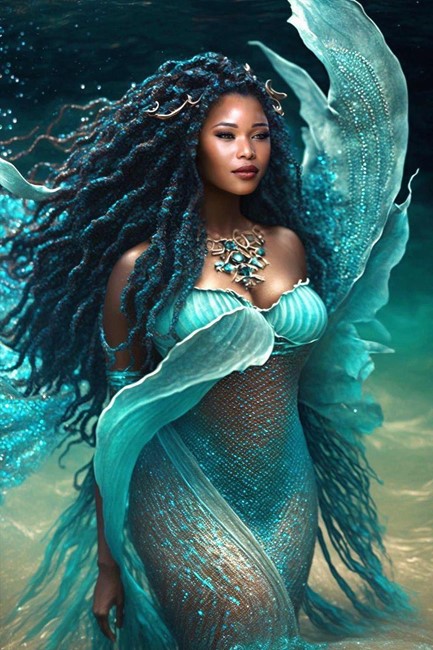Friday Poetry: JP CLARK’S OLOKUN: THE AESTHETIC DESCRIPTION OF AN AFRICAN GODDESS
I love to pass my fingers
(As tide thro' weeds of the sea
And wind the tall fern-fronds)
Thro' the strands of your hair
Dark as night that screens the naked moon:
I am jealous and passionate
Like Jehovah, God of the Jews,
And I would that you realize
No greater love had woman
From man than the one I have for you!
But what wakeful eyes of man,
Made of the mud of this earth,
Can stare at the touch of sleep
The sable vehicle of dream
Which indeed is the look of your eyes?
So drunken, like ancient walls
We crumble in heaps at your feet;
And as the good maid of the sea,
Full of rich bounties for men,
You lift us all beggars to your breast.
According to Yoruba mythology, Olokun was the Orisha (deity or spirit) of the waters of the earth and the depths of the ocean where the light never shone. Although most people believe that Olokun was a male deity, Olokun was venerated as male, female or androgynous. Therefore, Olokun’s gender usually depends on the religion in which the Orisha is worshipped (Famoriyo Dare Ebenezer, 2023). Judging by this establishment, one can infer that it is this goddess of water JP Clark’s Olokun pirouetted around. This review is going to address the subject matter of JP Clark’s poem through the aesthetic view of the cordial relationship between a sea lover and the sea.
In the very first line of the poem, there is a vivid imagery of revelry being passed across. Herein, we see the poet sugarcoat his fingers’ movement by likening it to the tide, and subsequently, the wind too. It is noteworthy to say that there is a deep connection between how Clark describes the movement of his own fingers and the natural rhythmical movement of the sea itself. This makes it clear that the first line is suggestive of some sorts of mutuality between the sea and the persona; the kind of mutuality that can only be found between two lovers.
Although Olokun is been said to have been venerated with no specific gender, it is easy to discern which gender JP Clark assumes Olokun to be: a goddess, with strands of hair “dark as night”. The romantic diction with which Clark describes the goddess helps put it at a focal point wherein she is matched with seductive qualities. Say the look of her eyes, for instance, is like the “sable vehicle of dream”. So to say, the poem exposes itself as an ode highlighting the alluring qualities of the sea goddess.
A further scrutiny into the poem, however, will make one come to an abrupt realization. The realization is that the poem might not just be expressing a mutual relationship between two entities, but also reflecting a person who is filled with passion for swimming. If it is looked at this way, the implication is that the whole motif of womanhood becomes a conceit representing the pleasure that comes with swimming. If so, then the idea of the movement of fingers through hair becomes suggestive of the movement of a body through the ripples of the sea. Similarly, the lines “we crumble in heaps at your feet…you lift us all beggars to your breasts” will therefore paint that visual imagery of diving, so that after crumbling into the feet of the sea, it lifts them up, afloat.
In conclusion, JP Clark’s Olokun has been able to foreground the aesthetic qualities of the goddess of the sea to its readers, taking them through heaps of images suggestive of beauty. With this poem, JP Clark immortalizes Olokun — an African goddess — forever as an art to be read about, like John Keats in his “Ode to Grecian Urn”.
Saheed Sunday, NGP V, is a Nigerian poet, a Star Prize awardee, a Best of the Net nominee, and a HCAF member. He is the author of a poetry collection: Rewrite The Stars. He won the ZODML Poetry Prize; he was shortlisted for the Rachel Wetzsteon Chapbook Award, Wingless Dreamer Poetry Prize and The Breakbread Literacy Project.





